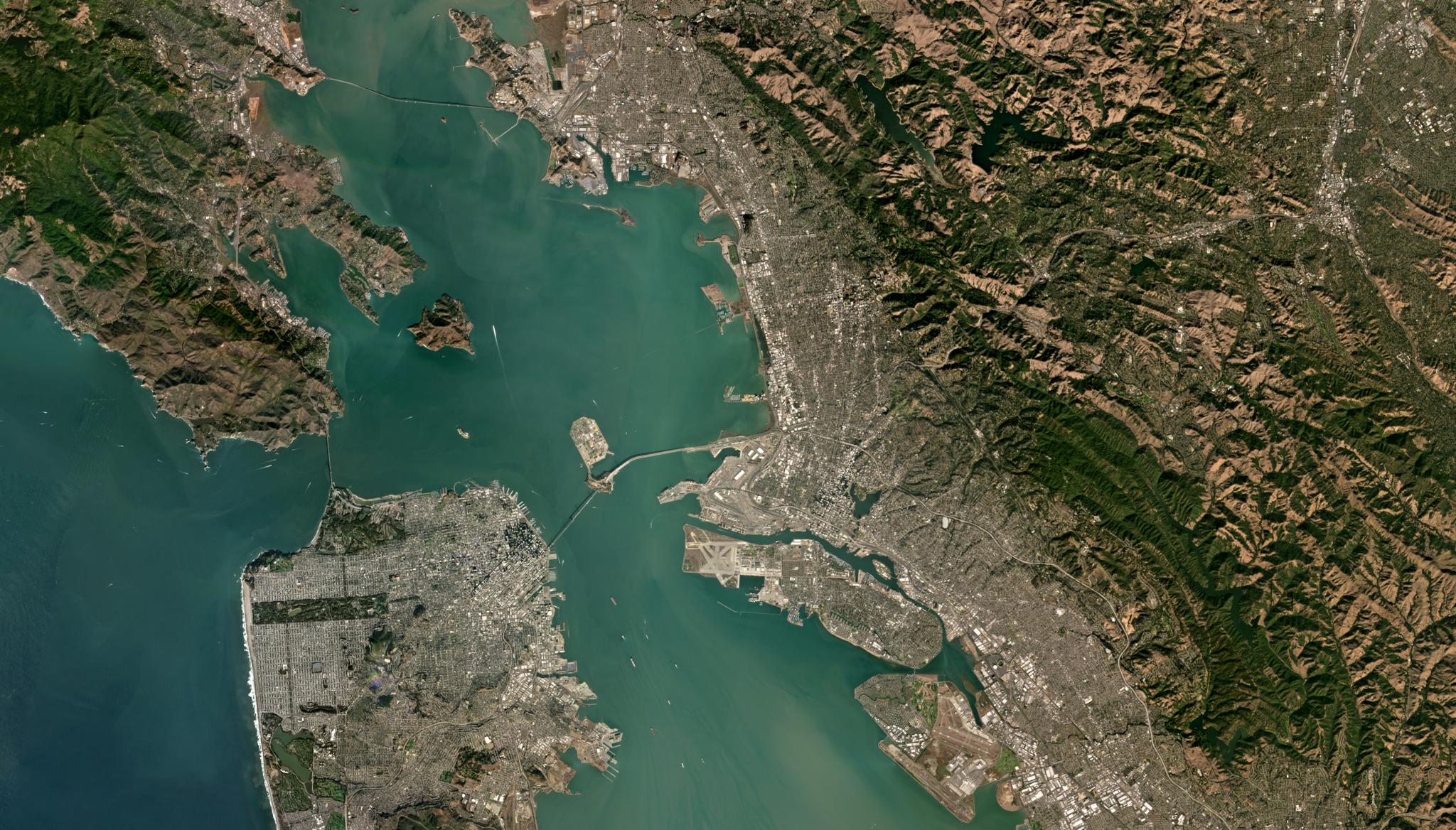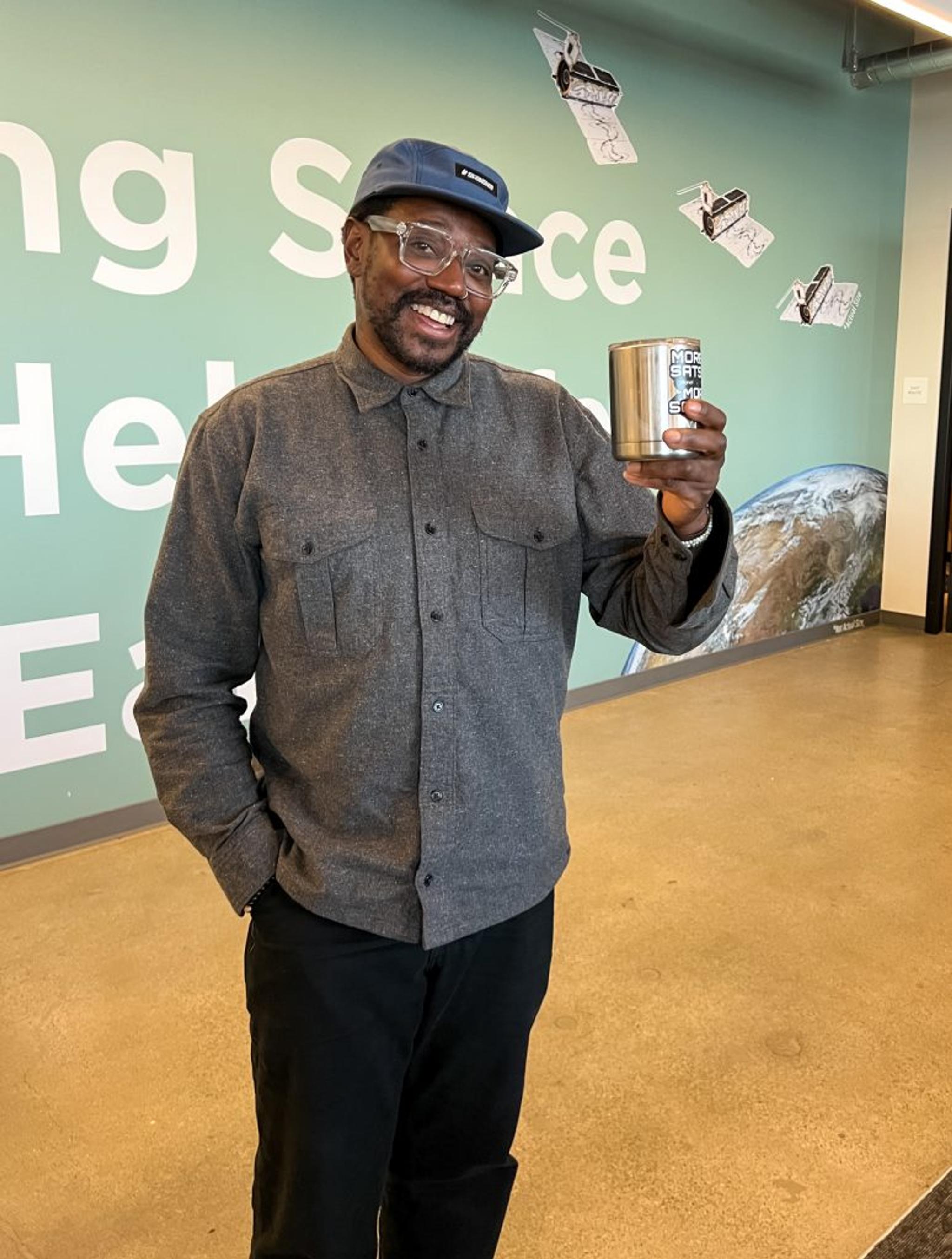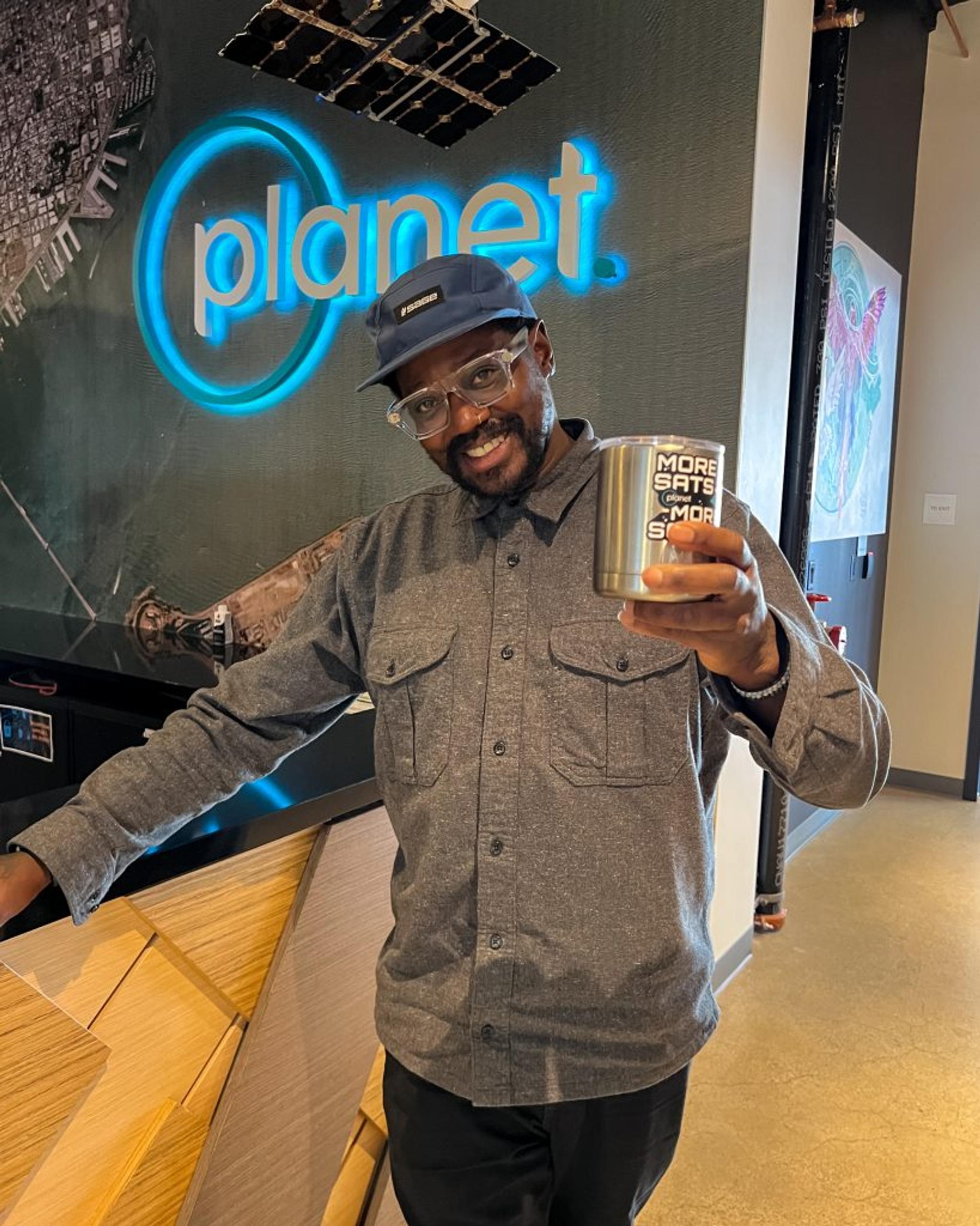Belonging Spotlight: William O’Neal on Philosophy, Linguistics, and Star Trek

Planet Monthly Mosaic of the Bay Area in California. © 2022, Planet Labs PBC. All Rights Reserved.
StoriesThis month, I sat down with William O'Neal, Planet’s Content Strategy Lead working with our Product Design, User Research, and Content Strategy team, to learn a little more about his career journey. With a nose ring and trendy transparent rimmed glasses, William is the type of person that strikes you as the most interesting person in a room - turns out that may have been by design and his interesting perspective on personal education.
“I studied philosophy and I remember my mom wanted to know, ‘What are you going to do with that?!’ I said, ‘I am going to be the most interesting guy in the cafe,” O’Neal laughed. “She should have hit me in the head, but that was just the kind of person that I was.”
O’Neal grew up in Berkeley, California where both his parents went to “Cal”- the affectionate name given to the University of California Berkeley by alumni. His mother went for law and his father for business. “Growing up in Berkeley was great, it was a pretty intellectually stimulating household to grow up in. A lot of my mom’s friends were of the civil rights generation, so there were these Black kids who were the first in their families to go to college and also go to law school. When I started kindergarten, my mom started law school, so she would bring me along to campus when I had a day off. I was their little mascot. I grew up around all these Black folks who were attorneys, judges, and doctors.”

He started his own college years at UC Santa Barbara, then transferred to San Francisco State to study philosophy. “I always loved learning,” he explained. “Then at 23, I actually had my first kid and decided to drop out of college and make the shift to my career.” It was 1994, and a booming time for the technology industry in California. “Not having a degree was never an issue. I thought about going back to college and finishing a lot. It was sort of a lingering thing, but with a full-time job, two kids, and classes that weren't online, when was I going to actually take classes?”
“The first job I got was for this non-profit in Oakland that taught at-risk youth how to use computers to develop job skills. I was always into computers and tech, taking things apart and rebuilding them. So, I was hanging out in East Oakland with these kids, teaching them how to make computers, put together resumes, and providing job training skills,” he shared.
Then in 1996, O’Neal got a job at CNET.com testing computers and playing with parts when an editor asked him to write a review of a computer he had been testing. “I had never written a product review, but I wrote the review and he loved it. I think the thing about studying philosophy is that it pretty much trains you for nothing,” he chuckled, “except how to critically think about things and write about them.”
This led O’Neal to jump into the editorial field for many years. “I became an editor in the early tech scene, writing for tech magazines and video game websites. Then eventually, I wanted to use my storytelling skills to evangelize for a company or product that I really believed in. I wrote a manifesto of what I wanted to do and sent it out into my sphere of influence.” A former manager reached out to him from Nvidia saying they were launching a new product and needed someone to lead the content marketing effort for it. As a self-proclaimed computer nerd, he said he knew it was a company he wanted to work for, and he began the next step in his career.
This eventually brought him to Autodesk where he led content marketing for the Autodesk Technology Centers and Autodesk Research. “You get these geniuses that build these amazing things, but they don’t always know how to talk about it. So, we’d sit down and I’d find out a simple way to describe their projects. They thought I was a genius.” O’Neal smiled. “I would say, ‘It’s just words.’ But not everyone knows how to craft a story or explain what they do.”
Now, at Planet, O’Neal leads the process of generating a cohesive content landscape for our products, helping define our UX (the user experience) from a content perspective. “We need linguistic consistency throughout the entire Planet experience. From pre-sales, accessing the account page, using Explorer, tasking, ordering scenes, and receiving support documentation. In all those things, there needs to be a common linguistic thread throughout the experience. At a high-level, my job is to ensure that that exists.”
“The Planet product landscape is super complex and challenging. It’s a really cool place, and everyday I learn something new. I wake up in the morning, and I also feel good about what I am doing. I think that the work that I do is in support of a mission to benefit the planet.”
For O’Neal being in a workplace that values representation is important. “For me, Belonging feels like there is a sense of comfort about where you happen to be. One of the things is seeing people like you in the space. I think that’s a big part of it; there is a certain level of safety that comes with that.”
“It’s like fishing. I’m all about adventures, skiing, traveling, and I love fishing. I have friends that run fishing charters and I assist as a deckhand. There’s a thing about being in the outdoors for Black people. You are often made to feel like you are invading a white space that is not for you. So, there is a certain level of anxiety that comes with being there. But last year, I was walking up to the clients who were set to get on the boat and it was six Black guys. I let them know that I was their deckhand, and they said, ‘Oh man, we’re really happy to be going with you! It can be weird, and we feel really comfortable right now.’ It was awesome.”
“I think that there’s a certain amount of anxiety and tension that you carry with you as a person of color or a woman in the tech industry, too. There are spaces where you don’t feel completely comfortable. Where you feel like your mistakes are amplified or you’re not allowed to be imperfect. For a person of color or even a woman, there could be a perception like, ‘Oh, that mistake is representative of who they actually are.’ Whereas for someone else, that mistake may be perceived as a learning opportunity. I think that when you see people like yourself in the building or in positions of leadership, it makes you feel like you belong there in a way that you can learn, you can make mistakes.”
As I discovered, O’Neal really values learning, and so, at the age of 50, he decided to pick up his formal academic journey again. “When Covid hit, everything went online, and San Francisco State went online! So, I was able to go back to SF State and enrolled in my first Zoom class. Studying philosophy in your 50’s? It’s way more interesting than when you are in your 20’s, especially if you have all of this life experience. I started taking classes on consciousness, the nature of being and knowing, and formal logic.”
The last thing he had to do to graduate was write a long essay that summed up his collegiate experience. “Typically, that experience is 4 or 5 years of your lifetime, but mine was in college, then not in college for 28 years, and then going back and finishing. My first paper was written in like 1988. I don’t even know what format that is in, it’s probably on a typewriter,” he laughed reflecting on his unique journey.
At the end of our conversation, I asked O’Neal about his hopes for the future, and O’Neal’s mind went towards equality and the fair distribution of planetary resources. “I’m a huge Star Trek fan. It’s a post-scarcity society, and I love the idea of a future that’s a post-scarcity society. I feel like so many of the problems that we have are really around resources, whether you’re talking about homelessness, mental health issues, or police violence, so many of these things are linked to income inequality. So…post-scarcity. If everyone could have their needs met, I imagine the human experience would be pretty awesome.”


Ready to Get Started
Connect with a member of our Sales team. We'll help you find the right products and pricing for your needs.

